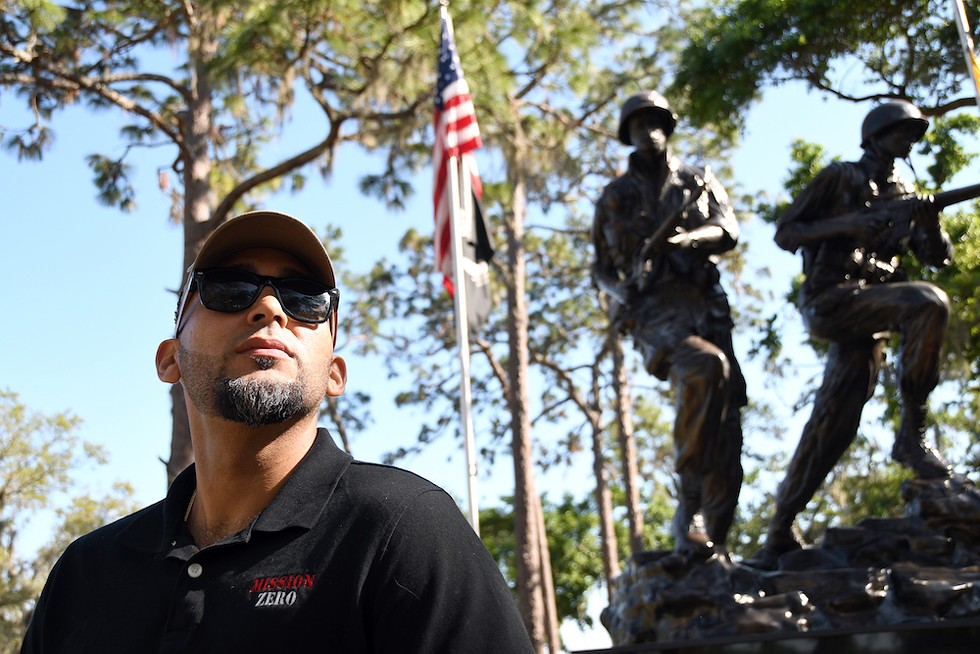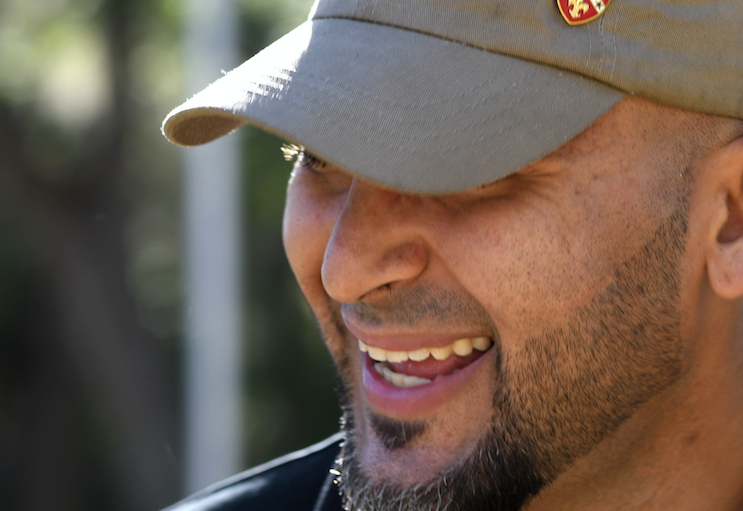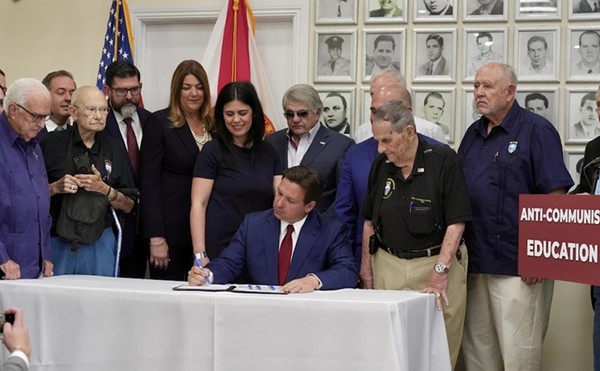Jose Belen is years removed from the war, but the war isn't removed from him.
Every so often, in the most mundane of moments, his mind strays back to the dust-filled, mangled hell that was Iraq in the mid-2000s. He can hear the hysterical yelling, a back and forth of English and Arabic, then the gunfire. He can feel his feet running toward a car, where the family had been. He can see the young brothers in the backseat, their arms draped around each other in a protective hug, blood seeping out of exit wounds in their backs, where the gunshots had caught them with one fatal sweep.
They were gone.
But she wasn't – their little sister, next to them in her beautiful white dress. She was alive, barely. Her deep brown eyes were open. She had taken a shot to the head.
Belen can remember racing toward the U.S. Army's medical tent with the girl in his arms, the doctors pushing him away as he lay her limp body on the table. "Don't die. Don't die. Don't die on me," he recalls himself saying.
But minutes later, she, too, was gone.
He thinks about how he and the other soldiers walked outside the tent. The others began to cry, but Belen told them to shut the fuck up. This was the United States Army, "not the fucking Boy Scouts." This was war; children die in wars. They would deal with it later.
Today, more than a decade removed from his 14-month deployment in Iraq and Afghanistan, he's still dealing with it.
"She was a fucking child," he says, tears welling in the corners of his eyes behind dark sunglasses. "I always wonder what happened to her, where she is, if she's in heaven."
"I left the battlefield 13 and a half years ago," Belen says, leaning forward on a park bench and settling his elbows on the tops of his thighs. He takes a deep breath and exhales, rubbing the open palms of his hands against each other. What seemed like the best remedy during the war – to tuck the trauma away in the most secluded corners of his mind – would lead to his eventual unraveling after he rejoined the civilian world.
As he says, "I started remembering."
It's late February, but the sunshine gleaming over Veterans Memorial Park just off the Sanford Riverwalk makes it feel like summertime. He comes here to clear his mind. Out of earshot of the city's white noise, all you can hear are birds chirping and the dull roar of an old man pressure-washing his sailboat on a distant dock.
Then, of course, there's the noise inside Belen's head, those unforgiving rumblings that come with post-traumatic stress disorder. The condition serves as a memento of his service as a decorated field artillery soldier in the U.S. Army – a parting gift for his patriotism and bravery.
Like many soldiers, he survived the battlefield only to come home a fragment of the man he was. After years of trying and failing to find the right pharmaceutical cocktail – something that would quell the relentless nightmares and keep his temper in check – Belen found an alternative treatment that works for his health, but doesn't work in accordance with federal law: cannabis.
Now, the 35-year-old finds himself toe-to-toe with the United States government, fighting for the rights of his fellow brothers and sisters in arms. He's part of a group suing Attorney General Jeff Sessions, the Department of Justice, the Drug Enforcement Agency and DEA Director Chuck Rosenberg for the right for all to legally use medical marijuana. (His medical marijuana certification as a patient in Florida is currently being processed.)
Included in that group are Belen; Marvin Washington, a former NFL player who advocates cannabis for pain; Alexis Bortel, a 12-year-old who requires cannabis oil for her epileptic seizures; Jagger Cotte, a 7-year-old who uses cannabis oil for a severe neurodegenerative disease; and the Cannabis Cultural Association, an organization that helps communities affected by the drug war participate in the legal cannabis industry.
The lawsuit, originally filed in July in the Southern District of New York, argues that the classification of marijuana as a Schedule I drug under the federal Controlled Substances Act is unconstitutional, as is its definition of the herb as a drug with "no accepted medical use" and "a high potential for abuse." It claims that the federal government has "admitted repeatedly in writing and implemented national policy reflecting that cannabis does, in fact, have medical uses and can be used and tested safely under medical supervision."
While several of his fellow plaintiffs require cannabis for physical ailments, Belen's involvement demonstrates that medical marijuana can also help those afflicted with psychological disorders.
Weed, he says, helps him get through the darkest moments, such as a recent trip to the dentist's office with his 4-year-old daughter, where he flashed back to the day he watched the little girl die in Iraq.
"I fought so hard to not break down in there. But that's why cannabis helps, because it allows you to block the pain in a way," he says. "I use it as medicine. Cannabis was able to help me find my smile again. That 19-year-old boy who enlisted – the kid before I got into Iraq that was going to kill if I had to, the guy who was bled of all emotion – started feeling love again, happiness, smiling."
According to a 2016 report from the U.S. Department of Veterans Affairs, which analyzed 55 million veterans' records from 1979 to 2014, approximately 20 veterans commit suicide every day. Many of those suicides come as a result of PTSD.
In all, PTSD afflicts about 9 percent of the VA's patients, as well as 20 percent of all Iraq and Afghanistan war veterans.
Many of these vets receive trauma-based psychotherapy – what the VA's website calls "the most highly recommended type of treatment for PTSD" – which typically focuses on different forms of cognitive-processing methods divvied up over several sessions. There's also narrative exposure therapy (i.e., talking through your trauma) and written exposure therapy (writing through it). Though the VA claims there isn't research to support such methods, it also recommends things like yoga, meditation and acupuncture.
Then there's cannabis. It's difficult to determine how many vets are using pot to treat their PTSD. The VA has only studied cannabis use among patients under its care, not among the general population of veterans with PTSD. Moreover, VA doctors can't prescribe it because of federal law.
That's despite the fact that marijuana has been legalized in some form in 29 states, the District of Columbia, Guam and Puerto Rico. Twenty-eight of those states (minus Alaska) now include PTSD in their medical marijuana programs.
At the federal level, the problem goes deeper. In January, Sessions rescinded an Obama-era Justice Department memo that had paved the way for states to implement their own marijuana laws without federal interference, bringing the future of legal weed into question. But that confusion wouldn't last, as President Donald Trump spiked Sessions' move earlier last week without consulting his attorney general.
Adding to the administration's dysfunction with marijuana policy: In a letter dated Dec. 21, former VA Secretary David Shulkin – who was dismissed by Trump on March 28 – refused a request in October from Democrats on the House Veterans Affairs Committee to study marijuana's effects. In their request, Democrats noted the nation's growing opioid crisis, which killed more than 42,000 Americans in 2016, and the increasing demand from veterans and major service groups, such as Veterans for Medical Cannabis and Operation EVAC (Educating Veterans About Cannabis), that want cannabis available as a treatment option.
In his response, Shulkin noted that federal law "restricts VA's ability to conduct research involving medical marijuana or to refer veterans to such projects." Shulkin also went further, arguing that some research found links between cannabis use and mental illness and suicidal ideation. While there's some evidence to back him up – particularly among heavy users – many other studies have demonstrated the plant's medicinal value. (The VA did not respond to Orlando Weekly's request for comment.)
Vets who use cannabis are often afraid to mention it to their VA physicians out of fear they might lose their benefits. Even after the VA issued a policy in December encouraging doctors to discuss marijuana with their patients, many still remain mum on the topic, says Melissa Bryant, chief policy officer for Iraq and Afghanistan War Veterans of America.
"That's the challenge," Bryant says. "It's been held up at least by the Department of Veterans Affairs to where there is a policy where the secretary allowed veterans to speak to their VA clinician about medical marijuana, supposedly without fear of retribution, without fear of losing their benefits. But it goes into your medical health record, and that leaves veterans wary of wanting to talk about it."
"You know what?" Belen yelled at his partner, Danielle, one afternoon in 2012. "You're going to come home one day and my brains are going to be splattered all over the wall! I'm going to kill myself, just so you know that!"
Belen was having another episode. His recurring nightmares had managed to twist his sleep cycle off track, which left him exhausted and susceptible to mood swings: high highs followed by low lows. At this point, he knew he was hell to deal with. As much as he didn't want to admit it, he knew he needed help.
By then, Danielle's resiliency had begun to wear down, and she slammed their bedroom door in Belen's face. As both their argument and Belen's temper cooled, she walked into his home office and gave him an ultimatum: Go to the VA for help, which Belen had only done once since arriving stateside in 2005, or she and her son were going to leave.
"Jose, I love you. My son loves you," she told him. "I'll stay with you until the day that I die, but I can't go on another day with the pressure and fear of coming home and finding you that way. That's not fair to me. That's not fair to my son."
Belen entered the VA's cognitive therapy program to cope with the loss of a friend in combat, even taking the time to stand alone in a cemetery at night as directed. He sat by himself in the dark, listening to recordings of himself during his sessions. And the doctors gave him a cocktail of pills and told him it would help.
It didn't.
This wasn't the first time medication hadn't worked as promised. At age 23, not long after arriving home, Belen went to the VA. He says the doctor put him on a combination of antidepressants and Ambien, which made him sleepwalk, so he nixed that soon after and went about his life.
These pills, those pills – for about five years, the cycle continued. Belen says he battled mostly in silence and often kept a pistol within reach, just in case he ever finally had the urge to pull the trigger.
"You play the game," Belen says. "Unfortunately, it's an invisible wound, PTSD, so you can't stick it, you can't perform surgery on it to heal it. All you have are these medications, and it's trial and error. You start feeling like a guinea pig. You start realizing that pretty much for the rest of your life this is your option, being a zombie all day, the suicidal ideation increases, all that stuff."
By 2016, the triggers and suicidal thoughts had continued to escalate. In his job as a salesman with a major insurance company, he was given a work-from-home position. But that only allowed Belen to isolate himself from the public, which was counterproductive.
Belen began self-medicating by starting his day off with a few gulps of Fireball whiskey. He had to hide his drinking from Danielle; he'd start as soon as she'd leave for work in the morning. At night, Belen remembers lying in bed beside his wife – they married in 2014 – and infant daughter, thinking to himself that he should grab the pistol he kept under the mattress: Just blow your brains out right now. Just do it.
If the right elements on the right day came together, Belen says, it would have happened. He knew he had to tell Danielle, so he did. She took his gun. They went to the VA.
This time, he tried to convince himself that the pills were working. But Danielle knew better. His temper continued to flare. The situation came to a head on an early Sunday morning in the driveway of their home, when Danielle awoke to find her husband's brother and a friend dragging an already-drunk Belen into their car to keep him away from the house.
He was going through another episode: This time, as he gazed at his Army service uniform hanging in the garage, he had convinced himself that that day, Oct. 23, was the day he would finally kill himself. Belen started grilling steaks on the front lawn at 6 a.m. while he waited to watch the Los Angeles Rams and New York Giants face off in an early-morning game in London, the whole time drinking Fireball and texting his brother that he was going to end his life.
Afterward, a VA doctor told Belen that he had been given the wrong medication and it was like "throwing gasoline on a fire." So Belen decided that enough was enough. He toned down his drinking, quit the pills cold turkey and resorted solely to weight lifting and using cannabis. Since coming home from duty, he had used marijuana intermittently, though drug tests at his work kept him from using it regularly.
What no one told Belen was just how bad the physical withdrawals would be once he kicked the pharmaceuticals. He discovered that one afternoon while at the gym when he was overcome with nausea. After dragging his vomit-covered self home, he sent his daughter inside with Danielle's son: "Take your sister and lock yourself into your room. I'm extremely sick," Belen told him.
Once inside, Belen ran into his daughter's room and grabbed the rosary beads hanging above her crib. Down to his underwear and dry-heaving himself into exhaustion, Belen was crying and sweating bullets. He fell to the floor. He curled into a ball and tried to rock himself to sleep, squeezing the rosary beads until his knuckles were white. He prayed until he passed out on the soft living room carpet.
Nick Etten, founder and executive director of the Veterans for Cannabis Project, argues that all federal studies on medical cannabis are set up to fail because there's only one facility in the country – at the University of Mississippi – that's licensed for use in Food and Drug Administration-approved research.
"It's how they obstruct beneficial research," Etten says. "There's a lot of demand for product that can be used in FDA-approved research, but there's no supply because there's only the University of Mississippi and nobody wants to touch that."
Etten says that many growers and researchers believe the facility is less than subpar. In 2016, the DEA relaxed its rules enough to let other institutions apply to be cannabis-research facilities. However, none of those applications have been approved.
Veterans overwhelmingly support the study of medical cannabis for treatment. According to a November study conducted by the American Legion, 92 percent of veterans and caregivers support medical research on cannabis, while 82 percent of respondents support outright legalization of medical cannabis. The survey also found that 22 percent of veteran household respondents already use cannabis to treat a medical condition.
"Overall, I think this is indicative of the times," Bryant says. "We're seeing more and more discussion on how medical cannabis can help those who are suffering from chronic pain and from injuries."
Traditionally, that same chronic pain might have been treated with opioids. But because of the national epidemic, some have opted to use cannabis instead.
About 60 percent of all veterans returning from the Middle East suffer from some sort of chronic pain, according to VA research. Moreover, a 2014 study by the VA found that 15 percent of veterans regularly use opioids, and a 2011 study found that veterans were twice as likely to die from an opioid overdose compared to the rest of the population.
In addition, a recent study by the National Academy of Sciences, Engineering and Medicine found that states that offer doctors the ability to prescribe marijuana have 14 percent fewer opioid prescriptions. The researchers estimate that medical cannabis dispensaries reduced the number of opioid prescriptions by 3.7 million daily doses. The takeaway: Fewer opioids means fewer opioid addictions and overdoses for both veterans and everyone else.
If not for the severity of his condition, Belen wouldn't have used cannabis for treatment. If not for cannabis, he would have never found his way to the Southeast Cannabis Conference in Fort Lauderdale in June 2017. If not for the conference, he would never have met Montel Williams – the daytime TV host, who's a combat veteran as well – who pulled him onstage for Belen's first large public speaking opportunity. If not for meeting Williams, he would have never been hooked up with retired NFL player Marvin Williams, who convinced Belen to join the federal lawsuit.
The lawsuit, however, was dismissed by U.S. District Court Judge Alvin Hellerstein on Feb. 26, on the grounds that the plaintiffs ought to first pursue "administrative remedies," which could take as long as nine years, and that cannabis' medical value is something for the attorney general to consider, not a federal court. The judge took pains to note that "this decision should not be understood as a factual finding that marijuana lacks any medical use in the [U.S.]."
The plaintiffs are appealing to the U.S. Court of Appeals for the Second Circuit.
Regardless of what happens, this is the beginning, rather than the end, of the Belens' ride.
Jose and Danielle both resigned from their jobs, where he had been making upward of six figures a year, and launched an organization called Mission Zero, designed to help bring national awareness to veterans who are dealing with PTSD.
It hasn't been easy. The Belens were forced to give up their home and move in with Jose's mother. With less money in their pockets, they've found themselves in lines at Salvation Army for food.
"When you dedicate yourself to others, there is no clear path," Belen says.
Within eight months of using cannabis as his source of treatment, Belen says the difference in his everyday life is night and day. He wants to show more veterans the difference pot can make in their lives, too. It's become his mission.
The recurring nightmares, the outbursts, the mood swings – all that goes hand-in-hand with post-traumatic stress. It hasn't gone away, he says, but he's coping with his condition instead of feeling like the walking dead.
He cried leaving Iraq and he cried leaving Afghanistan. He had assimilated to the lifestyle that comes with fighting in a war. But over the last year, he's finally begun to assimilate to his life outside of the war, more than 13 years later.
Belen feels at peace. "What do you do when you come home and you've prayed for war every second you're out there, and prayed to be in a situation where you can either take the enemy's life or he can take your life?" he asks himself.
He pauses.
"You see shit, you're a part of shit, and there are demons you take home with you. It's part of the sacrifice," he says. "This isn't a fucking sob story for me. You're conditioned mentally to never break – the warrior spirit goes within you."
Belen is years removed from the war, but the war will never be removed from him.























